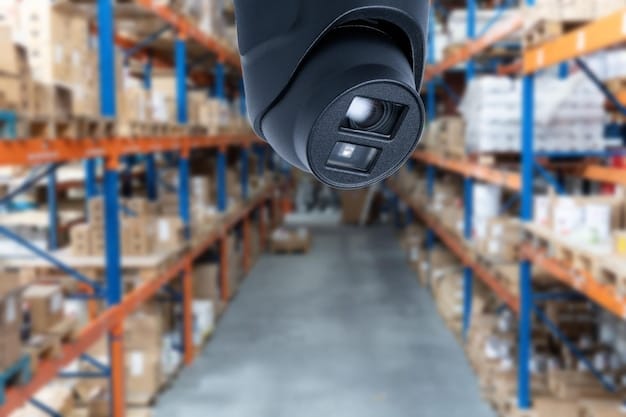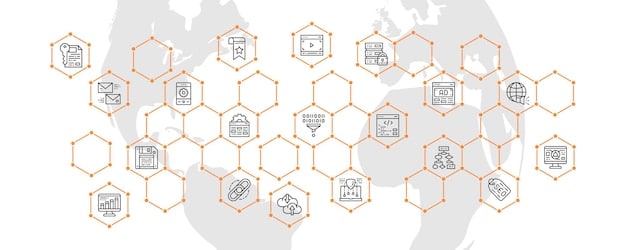Data Security in US Logistics: Protecting Sensitive Information

Data Security: Protecting Sensitive Information in the US Logistics Industry is crucial for maintaining operational integrity, regulatory compliance, and customer trust by implementing robust cybersecurity measures to prevent data breaches and ensure the secure flow of goods and information.
In the fast-paced world of US logistics, the importance of data security: protecting sensitive information in the US logistics industry cannot be overstated. From shipment tracking to supply chain management, data is the lifeblood of the industry, making it a prime target for cyber threats.
Understanding the Landscape of Data Security in Logistics
The logistics industry handles vast amounts of sensitive data, including customer information, shipping details, and financial records. Understanding the unique challenges and vulnerabilities within this landscape is the first step towards building a robust data security strategy.
The Types of Data at Risk
Logistics companies must recognize the different types of data they handle and the risks associated with each. This knowledge is essential for prioritizing security measures and protecting the most vulnerable information.
- Customer Data: Includes names, addresses, contact information, and payment details.
- Shipping Information: Details about package contents, destinations, and tracking information.
- Financial Records: Invoices, payment transactions, and banking details.
- Operational Data: Supply chain information, warehouse management data, and transportation schedules.
This data is essential for the functioning of the logistics industry but can be devastating if compromised. Identifying what data is at risk helps companies focus on specific security measures tailored to their unique needs.

Common Cyber Threats in the Logistics Sector
The logistics industry faces a range of cyber threats, from ransomware attacks to phishing scams. Understanding these threats helps companies develop effective prevention and response strategies.
- Ransomware: Malicious software that encrypts data and demands a ransom for its release.
- Phishing: Deceptive emails or messages designed to steal sensitive information.
- Malware: Various types of malicious software that can damage or disrupt computer systems.
- Insider Threats: Security breaches caused by employees or insiders with access to sensitive data.
These threats are constantly evolving, requiring logistics companies to stay vigilant and adapt their security measures accordingly. Regular training and awareness programs can help employees recognize and avoid these threats.
In conclusion, understanding the landscape of data security in logistics involves recognizing the types of data at risk and the common cyber threats that target the industry. This awareness is crucial for developing and implementing effective security measures.
The Importance of Compliance and Regulations
Compliance with data security regulations is not just a legal requirement for logistics companies; it’s also a crucial step in building trust with customers and partners. Adhering to these regulations helps protect sensitive data and avoid costly penalties.
Key Data Protection Regulations in the US
Several data protection regulations in the US apply to the logistics industry. Understanding these regulations is crucial for maintaining compliance and avoiding legal repercussions.
- California Consumer Privacy Act (CCPA): Grants California residents certain rights regarding their personal data.
- General Data Protection Regulation (GDPR): Although based in the EU, it affects any company processing data of EU citizens.
- Health Insurance Portability and Accountability Act (HIPAA): Protects sensitive patient health information.
- Payment Card Industry Data Security Standard (PCI DSS): Ensures the safe handling of credit card information.
Staying abreast of these regulations and implementing the necessary security measures is a continuous process. Logistics companies must regularly review their compliance efforts and update their policies to reflect any changes in the regulatory landscape.

Consequences of Non-Compliance
Failing to comply with data protection regulations can have significant consequences for logistics companies, including financial penalties, reputational damage, and loss of customer trust.
- Financial Penalties: Regulatory bodies can impose hefty fines for data breaches and non-compliance.
- Reputational Damage: A data breach can erode customer trust and damage a company’s reputation.
- Legal Action: Affected parties may file lawsuits seeking compensation for damages caused by data breaches.
- Operational Disruptions: Data breaches can disrupt operations and lead to significant downtime.
These consequences underscore the importance of prioritizing data security and compliance. Logistics companies must invest in robust security measures and regularly audit their systems to ensure compliance with all applicable regulations.
In summary, compliance with data protection regulations is essential for logistics companies to protect sensitive data, avoid penalties, and maintain customer trust. Staying informed about the latest regulations and implementing appropriate security measures is an ongoing process that requires continuous attention.
Implementing Robust Cybersecurity Measures
Implementing robust cybersecurity measures is essential for protecting sensitive information in the logistics industry. These measures should encompass both technological solutions and employee training to create a comprehensive defense against cyber threats.
Technical Security Solutions
Technical security solutions play a critical role in protecting data from cyber threats. These solutions include firewalls, intrusion detection systems, and encryption technologies.
The Role of Firewalls and Intrusion Detection Systems
Firewalls and intrusion detection systems are essential tools for monitoring network traffic and detecting malicious activity. These systems act as a first line of defense against cyber threats, preventing unauthorized access to sensitive data.
- Firewalls: Act as a barrier between a network and external threats, blocking unauthorized access.
- Intrusion Detection Systems (IDS): Monitor network traffic for suspicious activity and alert administrators to potential threats.
- Intrusion Prevention Systems (IPS): Take proactive measures to block detected threats in real-time.
These systems must be regularly updated and maintained to ensure they remain effective against the latest cyber threats. Regular security audits and vulnerability assessments can help identify weaknesses in the network and ensure that these systems are properly configured.
The Importance of Data Encryption
Data encryption is a crucial security measure that protects sensitive information by converting it into an unreadable format. This ensures that even if data is intercepted by unauthorized parties, it cannot be accessed or understood.
- Data in Transit: Encrypting data while it is being transmitted over a network.
- Data at Rest: Encrypting data while it is stored on servers or devices.
- End-to-End Encryption: Ensuring data is encrypted from the sender to the recipient.
Encryption should be applied to all sensitive data, including customer information, financial records, and shipping details. Using strong encryption algorithms and regularly updating encryption keys can further enhance data protection.
In conclusion, implementing robust technical security solutions, such as firewalls, intrusion detection systems, and data encryption, is essential for protecting sensitive information in the logistics industry. These measures must be regularly updated and maintained to stay ahead of evolving cyber threats.
Employee Training and Awareness Programs
Employee training and awareness programs are a critical component of data security in the logistics industry. Educating employees about cyber threats and security best practices can significantly reduce the risk of data breaches and other security incidents.
Creating a Culture of Security Awareness
Building a culture of security awareness within a logistics company involves fostering an environment where employees understand the importance of data security and take personal responsibility for protecting sensitive information.
Regular Training Sessions on Cyber Threats
Regular training sessions are essential for keeping employees informed about the latest cyber threats and how to recognize and avoid them. These sessions should cover topics such as phishing scams, malware attacks, and social engineering tactics.
- Phishing Awareness: Teaching employees how to identify and avoid phishing emails and messages.
- Password Security: Encouraging employees to use strong, unique passwords and to avoid sharing them.
- Data Handling Practices: Educating employees on the proper handling and storage of sensitive data.
These training sessions should be interactive and engaging, using real-world examples and case studies to illustrate the potential impact of cyber threats. Regular quizzes and assessments can help reinforce the training and measure employee understanding.
Simulated Phishing Attacks
Simulated phishing attacks are a valuable tool for testing employee awareness and identifying areas where additional training is needed. These attacks involve sending fake phishing emails to employees and tracking who clicks on the links or provides sensitive information.
- Identifying Vulnerable Employees: Pinpointing employees who are most susceptible to phishing attacks.
- Reinforcing Training: Providing targeted training to employees who fall for the simulated attacks.
- Measuring Progress: Tracking the overall success rate of the simulated attacks over time.
These simulations should be conducted regularly and should be designed to mimic real-world phishing attacks as closely as possible. The results of the simulations should be used to improve training programs and enhance employee awareness.
In summary, employee training and awareness programs are essential for creating a culture of security within logistics companies. Regular training sessions on cyber threats and simulated phishing attacks can significantly reduce the risk of data breaches and other security incidents.
Data Breach Response and Recovery
Having a well-defined data breach response and recovery plan is crucial for logistics companies. This plan should outline the steps to take in the event of a data breach to minimize damage and ensure a swift recovery.
Developing an Incident Response Plan
An incident response plan is a comprehensive document that outlines the procedures to follow in the event of a data breach. This plan should include clear roles and responsibilities, as well as step-by-step instructions for containing the breach, investigating the cause, and restoring affected systems.
- Identifying Key Personnel: Designating individuals responsible for leading the response effort.
- Defining Communication Protocols: Establishing clear channels for communicating with stakeholders, including employees, customers, and regulatory agencies.
- Outlining Containment Strategies: Describing the steps to take to isolate affected systems and prevent further data loss.
The incident response plan should be regularly reviewed and updated to reflect changes in the company’s IT infrastructure and the evolving threat landscape. Regular testing of the plan, through simulations and drills, can help ensure that it is effective and that employees are familiar with their roles and responsibilities.
Steps to Take During a Data Breach
During a data breach, it is essential to act quickly and decisively to contain the damage and minimize the impact on the company and its stakeholders. This involves taking immediate steps to isolate affected systems, investigate the cause of the breach, and notify relevant parties.
- Isolate Affected Systems: Disconnect compromised systems from the network to prevent further data loss.
- Investigate the Cause: Determine how the breach occurred and what data was affected.
- Notify Stakeholders: Inform employees, customers, and regulatory agencies about the breach.
After the initial response, it is crucial to conduct a thorough post-incident analysis to identify any weaknesses in the company’s security posture and to implement measures to prevent future breaches. This may involve updating security policies, enhancing employee training, and implementing additional security controls.
In conclusion, a well-defined data breach response and recovery plan is essential for minimizing the impact of a data breach and ensuring a swift recovery. This plan should include clear roles and responsibilities, as well as step-by-step instructions for containing the breach, investigating the cause, and restoring affected systems.
Future Trends in Data Security for Logistics
The future of data security: protecting sensitive information in the US logistics industry is likely to be shaped by emerging technologies and evolving cyber threats. Staying ahead of these trends is crucial for logistics companies to maintain a strong security posture.
The Rise of AI and Machine Learning in Cybersecurity
Artificial intelligence (AI) and machine learning (ML) are playing an increasingly important role in cybersecurity, offering advanced capabilities for threat detection, prevention, and response. These technologies can analyze vast amounts of data to identify patterns and anomalies that may indicate a cyber attack.
- Automated Threat Detection: Using AI to automatically detect and respond to cyber threats in real-time.
- Predictive Security: Leveraging ML to predict future cyber attacks and proactively implement security measures.
- Enhanced Incident Response: Utilizing AI to automate and streamline the incident response process.
Logistics companies can benefit from adopting AI-powered cybersecurity solutions to enhance their threat detection capabilities and improve their overall security posture. However, it is important to ensure that these solutions are properly configured and maintained to maximize their effectiveness.
The Increasing Importance of Blockchain Technology
Blockchain technology offers a secure and transparent way to manage and share data across the logistics industry. By creating a distributed ledger of transactions, blockchain can enhance data integrity and prevent unauthorized modifications.
- Secure Data Sharing: Enabling secure and transparent data sharing among logistics partners.
- Improved Supply Chain Visibility: Enhancing visibility into the supply chain by tracking goods and transactions on the blockchain.
- Reduced Fraud: Minimizing the risk of fraud and theft by ensuring data integrity and transparency.
While blockchain technology offers significant benefits for data security, it is important to address any potential security vulnerabilities and ensure that the blockchain network is properly secured.
In summary, the future of data security in logistics is likely to be shaped by emerging technologies such as AI, machine learning, and blockchain. Staying abreast of these trends and adopting innovative security solutions is crucial for logistics companies to maintain a strong security posture and protect sensitive information.
| Key Point | Brief Description |
|---|---|
| 🛡️ Data Encryption | Secures data both in transit and at rest, preventing unauthorized access. |
| 🧑💻 Employee Training | Educates staff on identifying and avoiding cyber threats like phishing. |
| 🚨 Incident Response Plan | Outlines procedures for handling data breaches, minimizing damage and downtime. |
| 🤖 AI in Cybersecurity | Enhances threat detection and prevention using machine learning. |
Frequently Asked Questions (FAQ)
▼
Data security is crucial in logistics because the industry handles vast amounts of sensitive information, including customer data, shipping details, and financial records. Protecting this data is essential for maintaining operational integrity and customer trust.
▼
Common cyber threats in logistics include ransomware attacks, phishing scams, malware infections, and insider threats. These threats can compromise sensitive data and disrupt operations, making it essential to implement robust security measures.
▼
Logistics companies can comply with data protection regulations by implementing appropriate security measures, regularly reviewing their compliance efforts, and staying informed about the latest regulatory requirements. This includes adhering to regulations like CCPA and GDPR.
▼
Employee training is critical in data security because it educates employees about cyber threats and security best practices. Regular training sessions and simulated phishing attacks can significantly reduce the risk of data breaches and security incidents.
▼
AI and machine learning can enhance cybersecurity by automating threat detection, predicting future cyber attacks, and streamlining the incident response process. These technologies can analyze vast amounts of data to identify patterns and anomalies that may indicate a cyber threat.
Conclusion
In conclusion, data security: protecting sensitive information in the US logistics industry is a complex and ongoing challenge that requires a multi-faceted approach. By understanding the landscape of data security, complying with regulations, implementing robust cybersecurity measures, and staying ahead of future trends, logistics companies can protect sensitive data, maintain customer trust, and ensure the continued success of their operations.





